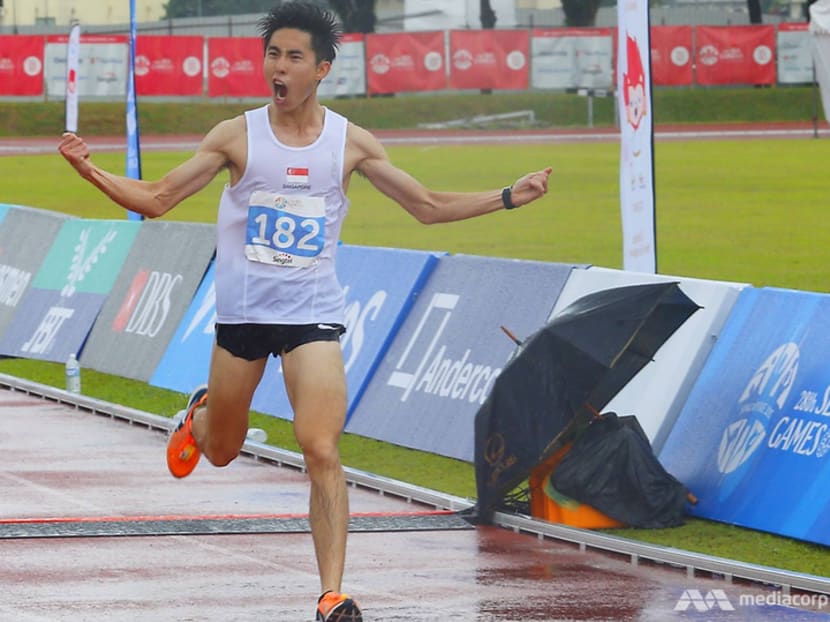Commentary: Soh Rui Yong’s 2.4km challenge tapped into our love-hate relationship with the distance
We all have our 2.4km run horror stories and tales of achievement, and the local athlete has just unleashed these feelings, says CNA 938’s Gerard Wong.

Soh Rui Yong crossing the finish line at the 28th SEA Games marathon event. (Photo: Ernest Chua/TODAY)
SINGAPORE: Despite being postponed to November, Soh Rui Yong’s Pocari Sweat Singapore 2.4km challenge is now probably one of the most anticipated local sporting events.
In 20 years of covering local sport, I have never come across anyone who’s taken a seemingly innocuous running distance that all of us are familiar with, and turn it into a massive talking point.
Here’s a quick summary: To generate publicity for its upcoming Pocari Sweat 2.4km Run, a mass participation event, the isotonic drink brand arranged for Soh to see how fast he can complete the distance.
Soh clocked 6 minutes 53.18 seconds, an incredibly fast time that’s akin to running six 400m laps at 69 seconds per lap.
And as the event was overseen by officials from Singapore Athletics, the national track and field body, Pocari then declared on social media the 30-year-old Soh, a two-time SEA Games marathon champion, as the first Singaporean to run this distance under 7 minutes.
A DARE ON SOCIAL MEDIA
That post and Soh’s own posts gained lots of traction online. While most reactions were positive, there were also brickbats.
Some questioned the achievement saying they knew of army mates and commando soldiers who could complete the distance just as fast as Soh did.
And that was when Soh took over and pulled off the marketing ace in the sleeve.
Issuing an open challenge on social media, he wrote:
“As a gesture of goodwill, I shall offer everyone, commando or not, the following incentive:
“Any Singaporean who runs sub-7:00 for 2.4km at next month’s Pocari Sweat Singapore 2.4km Run (Ground Race, 9-10 Oct) will receive $700 and 700 bottles of Pocari Sweat, both paid for by me.
“At the end of the day, it’s easy to make extraordinary claims without proof. Let’s settle the debate once and for all.”
With over 3,000 sign ups, the event has become the talk of the town. Originally scheduled for the Oct 9 to 10 weekend, it’s been moved to Nov 13 to 14 because of the latest safe distancing measures, which arguably also gives everyone more time to train.
That’s not all.
Soh will now also race with Subas Gurung, Singapore’s fastest Gurkha in the 2.4km, as part of the event. Subas, whose best time is 6 minutes 58 seconds, signed up for the event on his own, but has since accepted Soh’s invitation to race.
Companies have also jumped on the bandwagon by coming forward to sponsor prizes.
The prize pot now includes all sorts of other interesting rewards besides money – staycations, packets of chicken rice, cryptocurrencies, fitness devices, gym memberships and even a year’s supply of toilet paper.
THE 2.4KM ALBATROSS
One could dismiss the whole thing as a huge marketing gimmick. Maybe. But the fact that there are so many prizes on offer is a huge win – for both athlete and the brand.
There are now prizes for every category – adult men and women, students, and even non-Singaporeans – making this a truly grassroots sports event.
But it also begs the question: Why does the 2.4km run resonate so much with Singaporeans?
It’s because the distance has been an inescapable part of almost all our lives growing up – either in school as part of the National Physical Fitness Award (NAPFA) test, or in the army, as part of their IPPT (Individual Physical Proficiency Test).
Every Singaporean male knows what a rich source of distress the wretched distance is - especially when they are reservists and struggling to stay fit.
Before the Ministry of Defence changed the IPPT testing and scoring format in April 2015, a reservist aged 30 to 40 would have to clock between 13 and 14 minutes just to minimally pass the station.
Missing the mark by mere seconds, despite having desperately trained for it for months was one of the worst things that could happen to you.
Because it also meant you failed your entire IPPT, no matter how well you had passed the other stations. No ifs and buts – you were certifiably a failure, felled by the 2.4km Sword of Damocles.
You couldn’t shake off the feeling of despair at having to retake the test or sign up for remedial training (RT) which fell on weeknights and weekends.
Now, the IPPT now comprises of just three stations – push ups, sit-ups and the 2.4km - you don’t have to complete your run within 14 minutes to pass. Thankfully, it’s no longer a zero-sum game.
Instead, points are awarded based on the number of push-ups and sit-ups you do, and the 2.4km timing you clock. So long as all your points add up to more than 51 points, you’ve passed the IPPT.
The changes made to the 2.4km scoring system also means the distance is no longer as daunting, and stress-inducing as it was in the past. In fact, instead of an albatross around one’s neck, it has now become aspirational.
You can now aim for incremental improvements in your timings that will increase the points on your own mental scoreboard. Mentally and physically, it is also easier to train for.
Unlike a half or full marathon, one does not have to invest long hours and months training for it - precious time that many people don’t have or are unwilling to spare.
This may be the exact vein that this race has tapped on – a reason to get out and do our personal best in something we are so familiar with.
As a Facebook user Nick Chui wrote in a post which carried a photo of a timing of 11min 58sec on his Casio watch:
“2.4km timing today. Haven’t ran (sic) this fast for almost 20 years. Thank you, Soh Rui Yong, for your idea. May not meet your standard but good to challenge yourself.”
CAN ANYONE BREAK SOH’S RECORD?
Not everyone will win the prizes at stake, and no one is likely to break Soh’s, or Vanessa Lee’s records (She is the other athlete who ran in the Pocari Sweat 2.4km Challenge, clocking 7mins 59.69secs to become the first Singapore woman to go under 8 minutes).
But everyone can now take part in a run that was very much a part of their lives growing up. The fact that it is easy to train for, whatever our age is part of the huge interest in this race.
The biggest bonus for me is that we can sit back and watch a thrilling run take place between Soh and a clutch of excellent runners – Subas, Jeevaneesh Soundararajah, who represented Singapore in the 5,000 metres at the 2015 SEA Games, and Ethan Yan, who has clocked the fastest 2.4km in the army with a time of 7 mins 6 seconds.
This is what grassroots sports is about – almost akin to watching a football game in a full stadium. Except we are participants, trying to lead a healthier, sportier lifestyle.
When the next edition of the annual Singapore Sports Awards comes around, I hope this event is not only nominated for the Best Sports Event of the Year (Local) award but also wins it.
And hopefully, Soh gets to go on stage to receive it.
Gerard Wong is a senior editor with CNA938. A former sports journalist, he was also previously the sports editor at TODAY.








